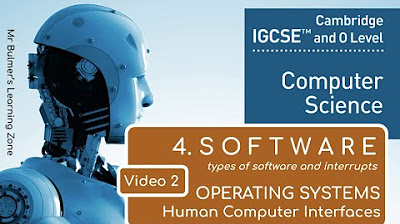Bab 8 Operating System (1) up
Summary
TLDRThis video session delves into operating systems, emphasizing their subprocesses and multitasking capabilities. It explains how operating systems manage and schedule applications, ensuring efficient performance through techniques like round-robin scheduling and memory management. The discussion also highlights the importance of virtual memory and segmentation in optimizing system resources, particularly when memory is limited. Furthermore, it contrasts different operating systems, including Windows and Android, and addresses the efficiency of memory management across various platforms. The session concludes with a focus on performance and battery consumption, setting the stage for future discussions.
Takeaways
- 😀 An operating system (OS) consists of multiple subprocesses that monitor and manage system operations continuously.
- 🔄 Process scheduling is crucial, with methods like Round Robin allowing fair CPU time allocation among applications.
- 💻 Operating systems handle multiple active applications simultaneously, optimizing performance and user experience.
- 🗂️ Memory management involves dynamic allocation of memory to applications, with systems employing techniques like virtual memory when RAM is limited.
- 📊 Virtual memory uses secondary storage to compensate for insufficient RAM, which can impact performance if overused.
- 🔧 Segmented memory management allows efficient allocation of memory by dividing it into segments tailored for specific applications.
- 🚀 Different operating systems have unique memory management strategies based on their architecture and processor specifications.
- ⚡ Efficient memory management and scheduling contribute to enhanced performance and lower power consumption in devices.
- 📈 Applications should be managed to avoid performance degradation, especially when memory resources are constrained.
- 👥 The session emphasized the importance of understanding OS functionalities, including process scheduling, memory management, and optimization strategies.
Q & A
What are the main components of an operating system as discussed in the transcript?
-The main components of an operating system include monitoring processes, managing memory, and scheduling applications.
What is the purpose of process scheduling in an operating system?
-Process scheduling ensures that multiple applications can run simultaneously by managing how the CPU allocates time to each process.
How does the round-robin scheduling method work?
-Round-robin scheduling allocates time slices to each active application in a circular manner, allowing them to run for a short period before switching to the next.
What challenges arise when an operating system has limited memory?
-Limited memory can lead to performance issues, as the system may struggle to run multiple applications simultaneously, resulting in slower operations.
What is the role of virtual memory in an operating system?
-Virtual memory allows the operating system to use hard disk space as additional memory, enabling it to run more applications than the physical RAM would typically allow.
Why is it important to manage memory efficiently in an operating system?
-Efficient memory management is crucial for optimizing performance, preventing slowdowns, and ensuring that applications have the resources they need to function properly.
What can happen if too many applications are opened simultaneously on a computer with limited memory?
-Opening too many applications can lead to slow performance, application crashes, and an overall decrease in system responsiveness due to memory overload.
How do different operating systems, like Android and Windows, manage memory?
-Different operating systems have their unique memory management mechanisms tailored to their architecture, such as segmenting memory or utilizing different scheduling algorithms.
What is the significance of segmenting memory in an operating system?
-Segmenting memory helps in organizing data efficiently, allowing the system to allocate memory to various applications without conflicts, enhancing performance.
How does an operating system handle the performance of applications running concurrently?
-An operating system utilizes scheduling algorithms and manages memory allocation to ensure that multiple applications can run effectively and without significant performance degradation.
Outlines

هذا القسم متوفر فقط للمشتركين. يرجى الترقية للوصول إلى هذه الميزة.
قم بالترقية الآنMindmap

هذا القسم متوفر فقط للمشتركين. يرجى الترقية للوصول إلى هذه الميزة.
قم بالترقية الآنKeywords

هذا القسم متوفر فقط للمشتركين. يرجى الترقية للوصول إلى هذه الميزة.
قم بالترقية الآنHighlights

هذا القسم متوفر فقط للمشتركين. يرجى الترقية للوصول إلى هذه الميزة.
قم بالترقية الآنTranscripts

هذا القسم متوفر فقط للمشتركين. يرجى الترقية للوصول إلى هذه الميزة.
قم بالترقية الآنتصفح المزيد من مقاطع الفيديو ذات الصلة
5.0 / 5 (0 votes)






